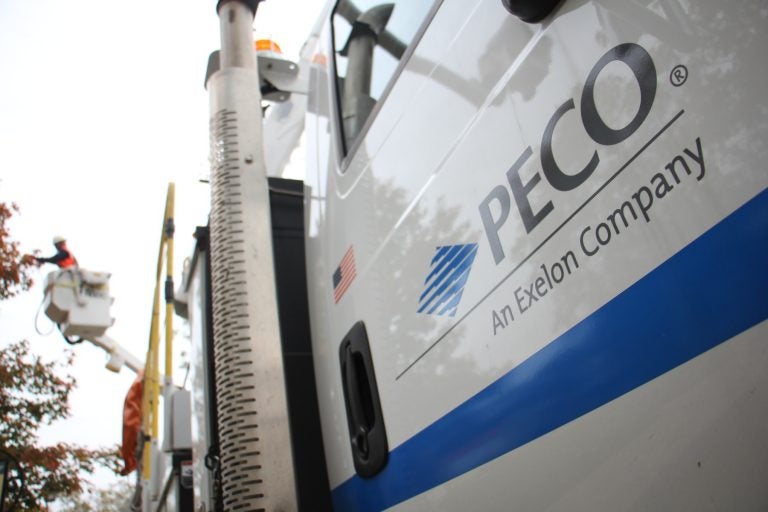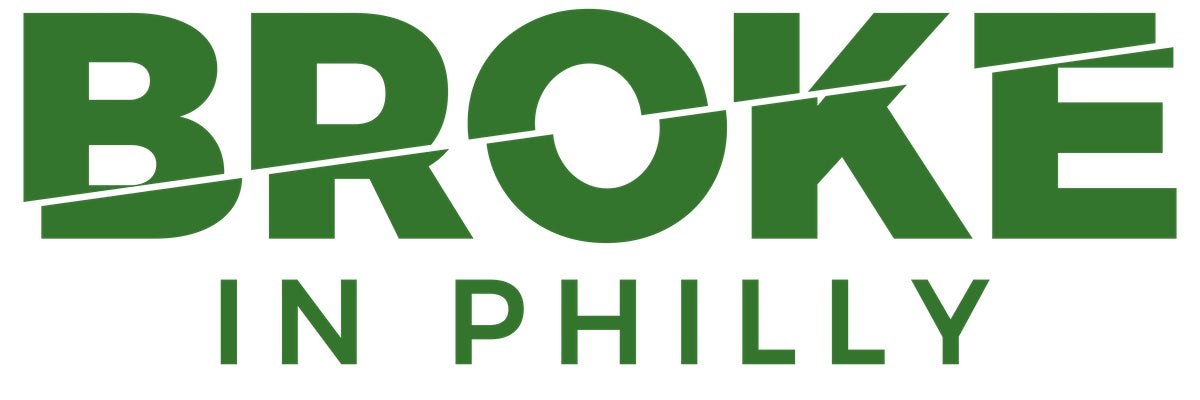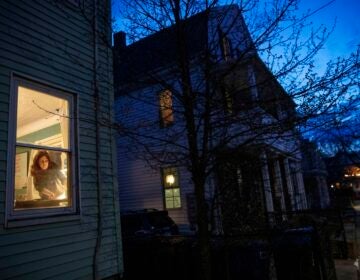Hundreds of thousands of people face utility shutoffs as pandemic surges
As shutoffs resume, Pa. utility customers who need help paying their bills have options under the state’s Public Utility Commission regulations.

PECO truck in the foreground, PECO worker in the background (Emma Lee/WHYY)
Chelsie DeSouza of South Philadelphia lost her job to the COVID-19 pandemic. So, a coronavirus-related moratorium on utility bills meant there was one less stress on her shoulders.
“It’s obviously very rough. You have to think about budgeting, how to pay rent, how to figure out all the things you still need to take care of, not making the income you were prior to the pandemic,” said DeSouza, who has a young child. “[The moratorium] was really helpful; it alleviated a lot of stress, I didn’t have to worry about my electricity shutting off. I had time paying.”
That bill came back this week when the moratorium ended on Nov. 9, thanks to a Pennsylvania Public Utility Commission vote.
The same day shutoffs resumed, DeSouza got an email from PECO informing her that the moratorium had ended and warned her of her past-due account. DeSouza panicked.
“It gave me a lot of anxiety, just trying to figure out how I would pay what I owed,” she said of the last-minute notice.
DeSouza was fortunate to be able to pay and avoid shutoff. Yet hundreds of thousands of Philadelphia households struggle with a more difficult path as unemployment soars and coronavirus infections surge.
As of June, the number of customers at risk of having their utilities shut off was as high as 800,000 for regulated utility companies, said Community Legal Services attorney Rob Ballenger. He expects the numbers to be even higher today. It is unknown how many customers of unregulated utility companies have also fallen behind and could be disconnected.
“Now, as our case numbers look to be awful and trending higher and higher every day now, there’s this additional likelihood of harm to a utility shutoff resulting from a lifting of the absolute ban of utility shutoffs in Pennsylvania,” Ballenger said.
Anyone whose household income is at or below 300% of the federal poverty level — about $65,000 a year for a family of three — can be protected from utility terminations. Under state law, publicly regulated utility companies are obligated to tell consumers how to avoid termination. That might include assistance programs they may be eligible for, many of which are funded by the state. PECO lists some of these programs on its website.
A PECO spokeswoman said there were more than 325,000 customers with outstanding balances as of Wednesday. She declined to say whether the utility had begun disconnecting people, but she noted that it has launched numerous customer assistance programs, and that customers who can’t pay their bills should call 1-888-480-1533 or visit the website for information on relief. Relief programs include payment plans with no added interest and grant programs for outstanding balances.
“We do not want to disconnect service to any customer, as electric and natural-gas service are critical during this challenging time. Disconnecting service is always a last resort. That’s why it’s imperative that customers act now and contact us to set up a payment arrangement plan and take advantage of customer assistance programs,” the spokeswoman said in an email.
A PGW spokesperson said the gas company hadn’t yet terminated anyone’s services, and that any customer struggling to pay a bill should call 215-235-1000 or visit its website. The company has several assistance programs available for customers in need.
“Our position is we’re trying to reach out to anyone who needs help and we’re trying to make sure everyone maintains service, and they should do that by contacting us as soon as they can and let us know what their situation is and we’ll connect them to services if they’re eligible,” she said.
But many people don’t know about the protections that exist, and Ballenger said it’s unclear how the utility companies will communicate with customers who are at risk for termination. Low-income individuals eligible for protections must also apply for assistance programs to qualify.
“Nowhere in the commission’s order does it shift the responsibility to the utility to ensure that customers are educated about the types of programs they have to apply for to maintain their utility service,” Ballenger said.
On that point, Community Legal Services has filed a petition for clarification with the Public Utility Commission. The PUC order that ended the moratorium “does not adequately explain what is required of customers to protect them from termination in the short timeframe established,” the petition filed with the state notes.
The end to the moratorium affects all utility providers. Ballenger said step one for any customer is to do exactly what PGW suggested and call the utility to ask for assistance. The provider should be able to determine the options for help, and if people believe they have been unfairly terminated they can file complaints with the PUC. If a household has an individual with a serious illness, that household can make use of medical protections available to all residential customers.
In Philadelphia, utility hardship funds are one option available to those who qualify. Utility companies also have customer assistance programs that provide for a discounted monthly bill and an opportunity to earn forgiveness of any accumulated debt for any period before enrollment in the program. But Ballenger said that the current pandemic and resulting economic crisis demands more help for families.
“You really cannot maintain a safe home without utility service, so if you don’t have the ability to pay you are really at a persistent and incurable risk, unless something changes, unless some additional funds are made available to you and your family,” he said.
The attorney noted that communities of color in Philadelphia are particularly at risk.
“So the threat over the long term is we may see a new form of public health crisis from people who are not able to safely reside in their homes because they no longer have utility services, and in the context of a pandemic, that to me is pretty frightening.”
 WHYY is one of over 20 news organizations producing Broke in Philly, a collaborative reporting project on solutions to poverty and the city’s push towards economic justice. Follow us at @BrokeInPhilly.
WHYY is one of over 20 news organizations producing Broke in Philly, a collaborative reporting project on solutions to poverty and the city’s push towards economic justice. Follow us at @BrokeInPhilly.

Get daily updates from WHYY News!
WHYY is your source for fact-based, in-depth journalism and information. As a nonprofit organization, we rely on financial support from readers like you. Please give today.





![CoronavirusPandemic_1024x512[1]](https://whyy.org/wp-content/uploads/2020/03/CoronavirusPandemic_1024x5121-300x150.jpg)


